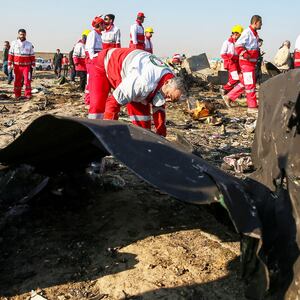Iranian authorities have said they accidentally shot down a Ukrainian jet with 176 people aboard—and the country’s aerospace chief said he wishes he was dead.
Tehran’s first acknowledgement of responsibility came early Saturday, just over a day after Western leaders said they had evidence to suggest Iran has downed Ukraine International Airlines Flight PS752. All aboard the Kyiv-bound plane were killed when it plummeted from the sky earlier this week in what Iranian authorities initially blamed on a “mechanical failure.”
Later on Saturday, Iran’s Islamic Revolutionary Guard Corps chief aerospace commander, Amir-Ali Hajizadeh, told reporters that he accepted all blame.
“I wish I was dead and such an incident hadn’t happened,” he said at a press briefing. “We in IRGC accept all the responsibility and are ready to implement any decision made by the establishment.”
During that press conference, the commander said he had actually requested that all commercial flights in Iran be grounded until tensions with the U.S. abated, but that those within the Armed Forces who had the power to do just that chose not to.
At a separate press briefing in Kyev, Ukraine, the airline’s CEO Yevgenii Dyhkne said his pilot had been in touch with the Tehran airport control tower just moments before the plane went down. “We have been reassured that [the aircraft] had the dialogue with the airport, with the dispatcher tower, until the last moment of the catastrophe,” he said. “There were negotiations about the route, they had permission to turn, so all of this is now connected to the investigation and I’m sure it will be available in documents in time.”
The tragedy occurred at a time when Iran and the U.S. appeared to be on the brink of war, just hours after Iran fired missiles at bases in Iraq housing U.S. forces in retaliation for the U.S. air strike that killed Quds commander Qassem Soleimani.
In a statement released early Saturday, the general staff of Iran’s armed forces said the flight was shot down after it was mistaken for a “hostile target” when it went towards a “sensitive military center” of the Revolutionary Guard. The military was at its “highest level of readiness” due to tensions with the U.S., the statement said.
“In such a condition, because of human error and in a unintentional way, the flight was hit,” the military said, adding that those responsible will face prosecution.
Iranian President Hassan Rouhani called the plane’s downing “unforgivable” and a “disastrous mistake,” saying the country “deeply regrets” it.
“My thoughts and prayers go to all the mourning families. I offer my sincerest condolences,” he tweeted after the military’s announcement.
Iranian Foreign Minister Javad Zarif said the announcement of the accidental downing marked a “sad day” but he went on to blame the Trump administration for the catastrophe.
“Human error at time of crisis caused by US adventurism led to disaster,” he wrote on Twitter.
“Our profound regrets, apologies and condolences to our people, to the families of all victims, and to other affected nations,” he said.
Eighty-two of those killed were Iranian, while 57 were Canadian and 11 were Ukrainian.
Canadian Prime Minister Justin Trudeau responded to Iran's admission with a statement focusing largely on the victims: “Our focus remains closure, accountability, transparency, and justice for the families and loved ones of the victims,” he said.
He went on to say Canada “expects full cooperation from Iranian authorities” in completing a “thorough investigation” into the tragedy.
Iranian historian Arash Azizi questioned how a country that could carry out such precision strikes on U.S. military bases that avoided loss of life could make such a disastrous mistake. “What is notable to me, however, is that Iran’s Revolutionary Guards, the praetorian guard of the Islamic Republic, was savvy enough to ensure that not a single American soldier was killed or injured when it rained its missiles on American military bases hosting thousands of soldiers in Iraq three days ago. But apparently it could not extend the same precautions to the lives of ordinary Iranians and foreign guests of our country,” he wrote in Iran Wire. “The PS752 disaster shows the gross negligence of a rotten regime that does not deserve to last. A poet may say: The only reason it survives is that it has forgotten to die.”






